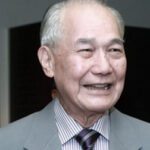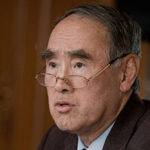The high-level participants included former presidents and prime ministers of Thailand, Sri Lanka, Republic of Korea and Netherlands, all Members of the Club de Madrid; Thailand’s Foreign Minister, and distinguished experts from various Asian countries.
The first part of the meeting evaluated the region’s responses to the global financial crisis. Presentations on the cases of China, Thailand, Republic of Korea and Cambodia confirmed that the region’s economic recovery is solid.
As Kasit Piromya, Thailand’s Foreign Minister put it, “Asia Pacific is not only recovering from the crisis but also leading growth across the world.”
According to Anand Panyarachun, former Prime Minister of Thailand, “The fact that the crisis did not impact so adversely Asia is partly due to the lessons learned in the region from the 1997 crisis. That crisis was a wake-up call that pushed Thailand to engage in a drastic reform process of its banking system. As a result, the current crisis did not affect the banking system at all.”
However, Mr. Kasit said that “it is very important to ensure that the growth is sustained.”
Ms Noeleen Heyzer, UN Undersecretary-General and Executive Secretary of ESCAP said, “There is a question mark on the ability of the region’s economies to sustain recovery beyond the fiscal stimulus packages as developed countries wind down the global imbalances or curb excessive consumption. The Asia-Pacific region will need to find new sources of supplementing aggregate demand to sustain its growth.”
Among the possible new sources of aggregate demand in the region, participants highlighted the 950 million poor in the region, who could provide a massive boost to domestic consumption if appropriate policies were implemented to lift them above the poverty line. The enormous gaps in infrastructure development across countries provide additional potential avenues for increasing domestic investment, as well as for allowing smaller and less develop countries to share the benefits of growth of their larger and more economically advanced neighbors.
However, the implementation of this far-reaching long-term agenda for the region will not be easy. As Hong Koo Lee, the former Prime Minister of the Republic of Korea put it, “expanding domestic consumption and regional integration will require vision and leadership, which are not obvious at the moment.”
The agenda of the upcoming Summit of the Group of 20 (G20) in Seoul in November 2010, which will be the first one to be held in the Asia-Pacific region, was discussed during the roundtable. In this context, participants highlighted that the Asia-Pacific region should play a role in global governance in accordance to its increasing economic strength. In this regards, Chandrika Kumaratunga, former President of Sri Lanka, said that “Asia-Pacific countries need to realize that they cannot just draw from the benefits of globalization – they also need to contribute to build it.”
In relationship with the G20 agenda, participants discussed details of current reforms initiatives for the global financial architecture. They also highlighted the need to complement such efforts by building a regional financial architecture, which could play an instrumental role in channeling Asia’s massive savings into its infrastructure development needs and narrow development gaps.
In concluding, Wim Kok, former Prime Minister of the Netherlands and President of Club de Madrid said that “in the months to come it will be necessary to find a balance between short-term macroeconomic coordination to prevent a double-dip recession and important long-term issues. Asia leaders need to be prepared to take the next steps forward.




